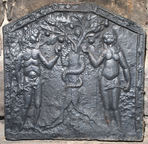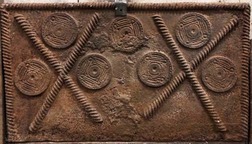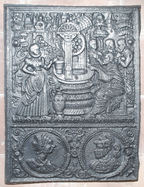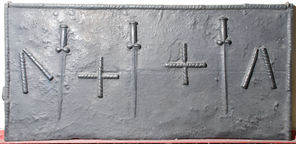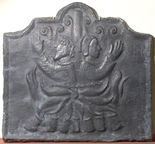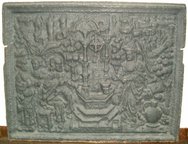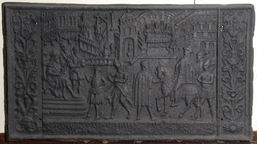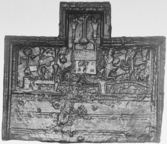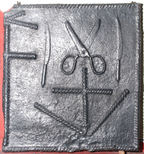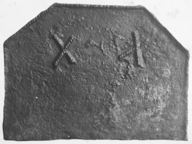-
843
Description: Canted rectangular shape; double fillet edging (top and sides) with alternating roses and diamonds between the fillets; pictorial scene of Adam and Eve, both naked, taking fruit from the Tree of Knowledge, between them, around which is entwined the serpent.
Notes: Boldly sculpted, stylised figures; the serpent is shown with a human face.
Copies of this fireback are known.
- Decoration tags:
- rectangular with canted top corners (shape)
- double fillet (edging)
- whole carved pattern
- planklines
- pictorial
- biblical
- animals
- humans
- plants
Manufactured: in the late-16th to early-17th century possibly in the Lorraine area of France.
Current location: Old Manor House, Ilkley, West Yorkshire, England.
(part of the Bradford Museums and Art Galleries museum group)
- Attached to series:
- Old Testament & Apocrypha firebacks
- Adam & Eve firebacks
-
1172
Description: Rectangular; twisted rope edging (top and sides); to each side, two saltires formed of crossed lengths of twisted rope; in between, and repeated seven times, a circular stamp decorated in low relief with a central disc perforated in the centre, surrounded by a circle inside a square looped at each corner, the sides of which are echoed twice on each side; the stamps are arranged in two rows, of three and four, in the upper part of the plate.
Notes: A boldly cast fireback with an excrescence top centre caused by disturbance of the casting sand by the pouring of the iron.
- Decoration tags:
- rectangular (shape)
- rope (edging)
- simple stamps
- carved stamps
- apotropaic
- objects
Manufactured: in the late-16th to early-17th century possibly in the Weald area of England.
Current location: Retrouvius, 1016 Harrow Road, Kensal Green, Brent, London, England.
- Attached to series:
- Food mould stamp firebacks
- Rope design firebacks
-
357
Description: Stove side plate; ovolo moulded edging; upper panel, pictorial scene of Jesus and the woman of Samaria (John: 4), with inscription below; lower panel, two circular frames, each with a figure, male to the right, female to the left, decorative scroll work between.
Notes: Stove plates were often used as firebacks once the stoves had been replaced by more efficient ones.
Inscription: VON DEN FREWLEIN VON SAMARIA IOHAN 4
- Decoration tags:
- rectangular (shape)
- flanged (edging)
- whole carved pattern
- planklines
- pictorial
- biblical
- architectural
- text
- humans
- objects
Manufactured: in the late-16th to early-17th century in the Eifel area of Germany.
Current location: Baddesley Clinton Hall, Knowle, Warwickshire, England.
(part of the National Trust museum group)
- Attached to series:
- Stoveplates
- Woman of Samaria stoveplates
-
373
Description: Rectangular, edged with twisted leather lengths on top and sides; a ballock dagger with hollow-ground cruciform blade, point down, impressed vertically three times and evenly spaced across the width of the back; between each, two short lengths of twisted leather, arranged in a cross; at either end, the same short lengths of dowel arranged in an inverted ‘V’.
Notes: The dagger (length approx. 38cm) dates from c1575-1625. The probable use of twisted leather is seen occasionally on other firebacks. The grouping of three daggers may also have apotropaic significance in relation to the Trinity.
- Decoration tags:
- rectangular (shape)
- twisted leather (edging)
- simple stamps
- planklines
- apotropaic
- objects
Manufactured: in the late-16th to early-17th century in the Weald area of England.
Current location: Anne of Cleves House, Southover High Street, Lewes, East Sussex, England.
Museum number: 1944.24.035 (part of the Sussex Archaeological Society museum group)
- Attached to series:
- Knife & Dagger stamp firebacks
-
396
Description: Cavetto-canted rectangle with arched top; astragal and cavetto edging (top and sides); pictorial; back-to-back figures of a bearded man and a woman in a poke bonnet, both dressed in tunics, their arms raised, respectively left and right; they are chained to a vertical pole; below, flames issue from vertically stacked logs, while smoke rises above them; the physical proportions of the figures are naïve, the man’s eyes being over-large, as are the hands of both.
Notes: The design is a free adaptation of an illustration from The Book of Martyrs by John Foxe (1563), a copy from a back originally noted at Brick Cottage, Burwash, Sussex, in 1871. This may be the design of fireback referred to in an enquiry printed in the St James's Chronicle, or British Evening Post, of 9 August 1788, which described it as 'having two Bishops burning at Stakes thereon' at a house in Warwickshire. At an auction sale in 2017 the same design of fireback was interpreted as the burning of Bishops Latimer and Ridley in 1555. Protestants were burnt to death at several Wealden locations as well as elsewhere in the south-east of England during the reign of Mary I, notably at Canterbury and Lewes. The subject of the fireback should be regarded as symbolic rather than commemorating any individual martyrs.
Copies of this fireback are known.
- Decoration tags:
- rectangular with canted top corners and round arch (shape)
- astragal with cavetto (edging)
- whole carved pattern
- pictorial
- historical
- humans
Manufactured: in the late-16th to early-17th century in the Weald area of England.
Current location: Anne of Cleves House, Southover High Street, Lewes, East Sussex, England.
Museum number: LH000.903 (part of the Sussex Archaeological Society museum group)
Citation: Butterfield, W. R., 1916, 'Old Wealden Firebacks', The Connoisseur, 46, pp. 197-209.
Citation: Dawson, C., 1903, 'Sussex Iron Work and Pottery', Sussex Archaeological Collections, 46, pp. 1-54.
Citation: Paine, C., Aug 2013, 'Mystery of the Two Martyrs', Sussex Past and Present, 130, pp. 6-7.
Citation: Straker, E., 1931, Wealden Iron (London, Bell).
- Attached to series:
- Commemorative firebacks
-
420
Description: Rectanglular; flanged cavetto-moulded edging; pictorial scene of Christ and the woman of Samaria at Jacob's Well.
Notes: Stoveplate; the scene illustrates the story from John 4.
- Decoration tags:
- rectangular (shape)
- flanged (edging)
- whole carved pattern
- pictorial
- biblical
- humans
Manufactured: in the late-16th to early-17th century possibly in the Eifel area of Germany.
Current location: Anne of Cleves House, Southover High Street, Lewes, East Sussex, England.
Museum number: LH000.797 (part of the Sussex Archaeological Society museum group)
Citation: Dawson, C., 1903, 'Sussex Iron Work and Pottery', Sussex Archaeological Collections, 46, pp. 1-54.
- Attached to series:
- Stoveplates
- Woman of Samaria stoveplates
-
421
Description: Rectangular; flanged edge; central pictorial panel illustrating Mordecai arriving before King Ahasuerus, Haman hanging from the gallows behind; two floral side panels, at the top of each a monogram within a cartouche: on the left KS, on the right H?D.
Notes: Stoveplate; the scene illustrates a scene from Esther 7: 10 and 8: 1. Formerly part of the J. H. Every collection.
Copies of this fireback are known.
Inscription: KS H[?]D
- Decoration tags:
- rectangular (shape)
- flanged (edging)
- whole carved pattern
- pictorial
- biblical
- architectural
- text
- humans
Manufactured: in the late-16th to early-17th century possibly in the Eifel area of Germany.
Current location: Anne of Cleves House, Southover High Street, Lewes, East Sussex, England.
Museum number: 1944.24.040 (part of the Sussex Archaeological Society museum group)
- Attached to series:
- Stoveplates
- Esther stoveplates
-
422
Description: Rectangular with a square projection middle top; castellated top edging; top centre, stylised Calvary; upper section: pictorial scene, centre, house with tiled roof, windows, and chimney at each end, paths leading from house; left, possible forge building with four chimneys and three water wheels, and adjacent furnace stack?; above, shed with lean-to, barrow, and wheel structure, all between trees; right, figure of a man running towards the house, unidentified objects between trees; lower section: plain panel with central triple-grooved horizontal line.
Notes: A striking and unusual fireback with a scene suggesting a connection with iron-making. Formerly part of the J. H. Every collection.
Copies of this fireback are known.
- Decoration tags:
- rectangular with square arch (shape)
- castellated (edging)
- whole carved pattern
- pictorial
- humans
- plants
- objects
Manufactured: in the late-16th to early-17th century possibly in the Eifel area of Germany.
Current location: Anne of Cleves House, Southover High Street, Lewes, East Sussex, England.
Museum number: 1944.24.045 (part of the Sussex Archaeological Society museum group)
- Attached to series:
- Miscellaneous pattern firebacks
-
453
Description: Rectangular; twisted rope edging; irregular arrangement of three rope lengths at top left; rope cross above ‘V’ at middle bottom; impression of a pair of scissors between two impressions of a domestic table knife.
Notes: The knife is early-17th century in date or perhaps a bit earlier, just into Elizabeth I’s reign. The pommels date them from around this time and the long and narrow blades are right for the end of Elizabeth/early James I. The irregular rope lengths suggest this is probably part of a larger fireback.
- Decoration tags:
- rectangular (shape)
- rope (edging)
- simple stamps
- apotropaic
- objects
Manufactured: in the late-16th to early-17th century in the Weald area of England.
Current location: Anne of Cleves House, Southover High Street, Lewes, East Sussex, England.
Museum number: LH000.939 (part of the Sussex Archaeological Society museum group)
Citation: Moore, S., 1999, Cutlery for the Table (Sheffield, The Hallamshire Press).
-
1048
Description: Canted rectangular shape; twisted rope edging (top and sides); two saltires formed of twisted rope irregularly arranged.
Notes: The small size suggests a 17th rather than a 16th century date. Formerly part of the J. H. Every collection.
- Decoration tags:
- rectangular with canted top corners (shape)
- rope (edging)
- simple stamps
- apotropaic
- objects
Manufactured: in the late-16th to early-17th century in the Weald area of England.
Current location: Anne of Cleves House, Southover High Street, Lewes, East Sussex, England.
Museum number: LH000.919 (part of the Sussex Archaeological Society museum group)
- Attached to series:
- Rope design firebacks
